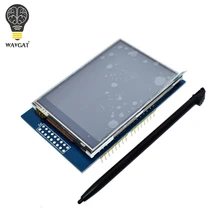I recently started looking through various shields I had no articles, code or tutorials for and came across a 2.8 Inch TFT LCD Shield Touch Display Screen Module For Arduino
Its a cracking display, here are some pictures of it
2.8 inch LCD TFT display
Bright, 4 white-LED backlight
Colorful, 18-bit 262,000 different shades
4-wire resistive touchscreen 240 x 320 pixels with individual pixel control
No wiring, no soldering.
Simply plug it in and load library
On-board 3.3V 300mA LDO regulator
5V compatible, use with 3.3V or 5V logic
Support 2GB micro SD TF card
Size: 7.8 x 5.3cm
Parts List
Code
I connected the shield to an Arduino Mega
4 libraries are required with the code example that I tested with – I uploaded these to my github site
[codesyntax lang=”cpp” lines=”fancy”]
// IMPORTANT: Adafruit_TFTLCD LIBRARY MUST BE SPECIFICALLY
// CONFIGURED FOR EITHER THE TFT SHIELD OR THE BREAKOUT BOARD.
// SEE RELEVANT COMMENTS IN Adafruit_TFTLCD.h FOR SETUP.
//Technical support:goodtft@163.com
#include <Adafruit_GFX.h> // Core graphics library
#include <Adafruit_TFTLCD.h> // Hardware-specific library
// The control pins for the LCD can be assigned to any digital or
// analog pins...but we'll use the analog pins as this allows us to
// double up the pins with the touch screen (see the TFT paint example).
#define LCD_CS A3 // Chip Select goes to Analog 3
#define LCD_CD A2 // Command/Data goes to Analog 2
#define LCD_WR A1 // LCD Write goes to Analog 1
#define LCD_RD A0 // LCD Read goes to Analog 0
#define LCD_RESET A4 // Can alternately just connect to Arduino's reset pin
// When using the BREAKOUT BOARD only, use these 8 data lines to the LCD:
// For the Arduino Uno, Duemilanove, Diecimila, etc.:
// D0 connects to digital pin 8 (Notice these are
// D1 connects to digital pin 9 NOT in order!)
// D2 connects to digital pin 2
// D3 connects to digital pin 3
// D4 connects to digital pin 4
// D5 connects to digital pin 5
// D6 connects to digital pin 6
// D7 connects to digital pin 7
// For the Arduino Mega, use digital pins 22 through 29
// (on the 2-row header at the end of the board).
// Assign human-readable names to some common 16-bit color values:
#define BLACK 0x0000
#define BLUE 0x001F
#define RED 0xF800
#define GREEN 0x07E0
#define CYAN 0x07FF
#define MAGENTA 0xF81F
#define YELLOW 0xFFE0
#define WHITE 0xFFFF
#include <MCUFRIEND_kbv.h>
MCUFRIEND_kbv tft;
// If using the shield, all control and data lines are fixed, and
// a simpler declaration can optionally be used:
// Adafruit_TFTLCD tft;
void setup(void) {
Serial.begin(9600);
Serial.println(F("TFT LCD test"));
#ifdef USE_ADAFRUIT_SHIELD_PINOUT
Serial.println(F("Using Adafruit 2.4\" TFT Arduino Shield Pinout"));
#else
Serial.println(F("Using Adafruit 2.4\" TFT Breakout Board Pinout"));
#endif
Serial.print("TFT size is "); Serial.print(tft.width()); Serial.print("x"); Serial.println(tft.height());
tft.reset();
uint16_t identifier = tft.readID();
if(identifier == 0x9325) {
Serial.println(F("Found ILI9325 LCD driver"));
} else if(identifier == 0x9328) {
Serial.println(F("Found ILI9328 LCD driver"));
} else if(identifier == 0x4535) {
Serial.println(F("Found LGDP4535 LCD driver"));
}else if(identifier == 0x7575) {
Serial.println(F("Found HX8347G LCD driver"));
} else if(identifier == 0x9341) {
Serial.println(F("Found ILI9341 LCD driver"));
}else if(identifier == 0x7783) {
Serial.println(F("Found ST7781 LCD driver"));
}else if(identifier == 0x8230) {
Serial.println(F("Found UC8230 LCD driver"));
}
else if(identifier == 0x8357) {
Serial.println(F("Found HX8357D LCD driver"));
} else if(identifier==0x0101)
{
identifier=0x9341;
Serial.println(F("Found 0x9341 LCD driver"));
}else {
Serial.print(F("Unknown LCD driver chip: "));
Serial.println(identifier, HEX);
Serial.println(F("If using the Adafruit 2.8\" TFT Arduino shield, the line:"));
Serial.println(F(" #define USE_ADAFRUIT_SHIELD_PINOUT"));
Serial.println(F("should appear in the library header (Adafruit_TFT.h)."));
Serial.println(F("If using the breakout board, it should NOT be #defined!"));
Serial.println(F("Also if using the breakout, double-check that all wiring"));
Serial.println(F("matches the tutorial."));
identifier=0x9341;
}
tft.begin(identifier);
}
void loop(void) {
tft.fillScreen(BLACK);
unsigned long start = micros();
tft.setCursor(0, 0);
tft.setTextColor(RED); tft.setTextSize(1);
tft.println("Hello World!");
tft.println(01234.56789);
tft.println(0xDEADBEEF, HEX);
tft.println();
tft.println();
tft.setTextColor(GREEN); tft.setTextSize(2);
tft.println("Hello World!");
tft.println(01234.56789);
tft.println(0xDEADBEEF, HEX);
tft.println();
tft.println();
tft.setTextColor(BLUE); tft.setTextSize(3);
tft.println("Hello World!");
tft.println(01234.56789);
tft.println(0xDEADBEEF, HEX);
tft.setTextColor(WHITE); tft.setTextSize(4);
tft.println("Hello!");
tft.setTextColor(YELLOW); tft.setTextSize(5);
tft.println("Hello!");
tft.setTextColor(RED); tft.setTextSize(6);
tft.println("Hello!");
tft.println();
tft.println();
/*
tft.println();
tft.setTextColor(GREEN);
tft.setTextSize(5);
tft.println("Groop");
tft.setTextSize(2);
tft.println("I implore thee,");
tft.setTextSize(1);
tft.println("my foonting turlingdromes.");
tft.println("And hooptiously drangle me");
tft.println("with crinkly bindlewurdles,");
tft.println("Or I will rend thee");
tft.println("in the gobberwarts");
tft.println("with my blurglecruncheon,");
tft.println("see if I don't!");*/
delay(1000);delay(1000);delay(1000);delay(1000);delay(1000);
}
[/codesyntax]


